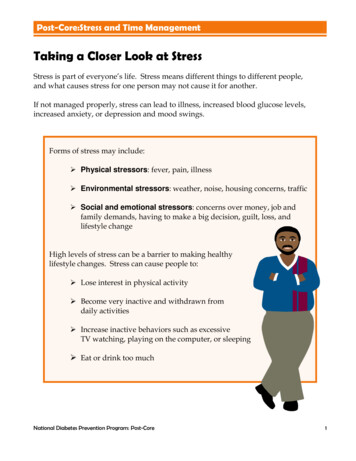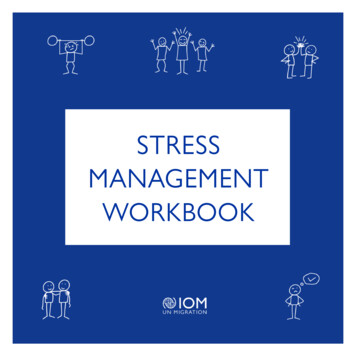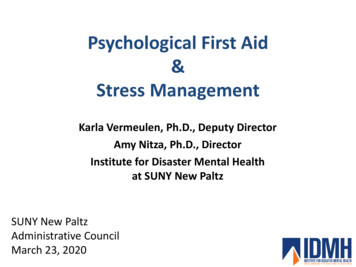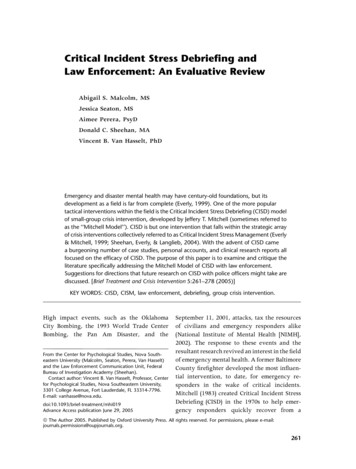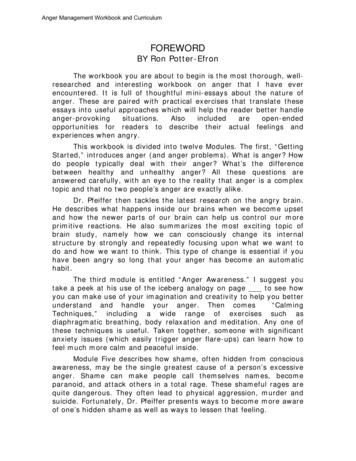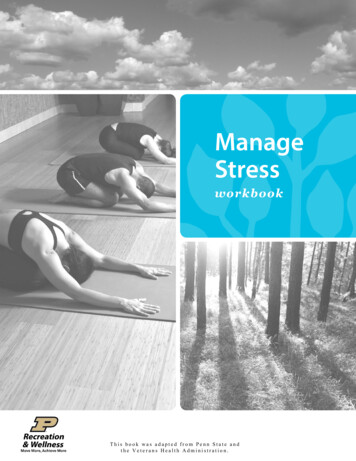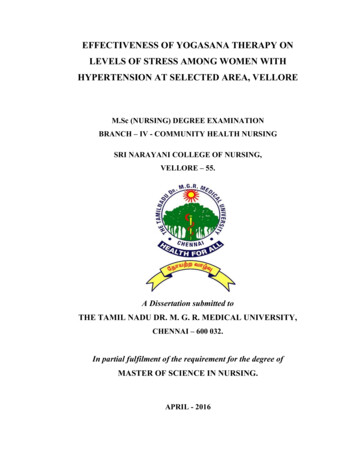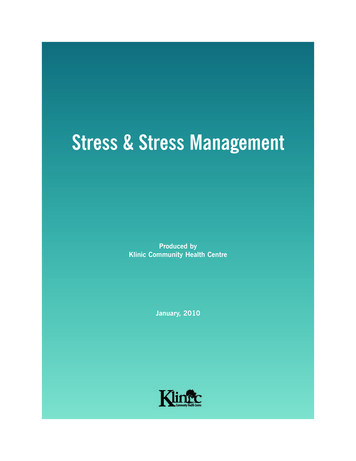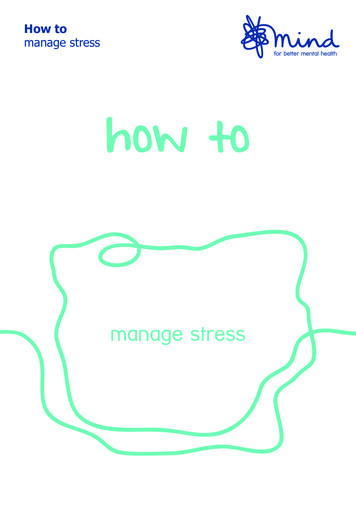
Transcription
How tomanage stresshow tomanage stress
How to manage stressThis booklet is for anyone who wants to learnhow to manage stress. It explains what stress is,what might cause it and how it can affect you.It also includes information about ways you canhelp yourself and how to get support, as well asproviding tips for friends and family.
ContentsWhat is stress?4What are the signs of stress?6What causes stress?7How can I deal with pressure?10How can I become more emotionally resilient?12What treatments are there for stress?16How can friends and family help?18Useful contacts203
How to manage stressWhat is stress?We all know what it's like to feel stressed, but it's not easy to pin downexactly what stress means. When we say things like "this is stressful" or"I'm stressed", we might be talking about: Situations or events that put pressure on us – for example, timeswhere we have lots to do and think about, or don't have much controlover what happens. Our reaction to being placed under pressure – the feelings we getwhen we have demands placed on us that we find difficult to cope with.It's overwhelming. Sometimes you can't see beyond the thickfog of stress.There's no medical definition of stress, and health care professionalsoften disagree over whether stress is the cause of problems or the resultof them. This can make it difficult for you to work out what causes yourfeelings of stress, or how to deal with them. But whatever your personaldefinition of stress is, it's likely that you can learn to manage your stressbetter by: managing external pressures, so stressful situations don't seem tohappen to you quite so often (see p.10) developing your emotional resilience, so you're better at coping withtough situations when they do happen (see p.12).Is stress a mental health problem?Being under pressure is a normal part of life. It can be a useful drive thathelps you take action, feel more energised and get results. But if youoften become overwhelmed by stress, these feelings could start to be aproblem for you. Stress isn't a psychiatric diagnosis, but it's closely linkedto your mental health in two important ways:4
What is stress? Stress can cause mental health problems, and make existing problemsworse. For example, if you often struggle to manage feelings of stress,you might develop a mental health problem like anxiety or depression. Mental health problems can cause stress. You might find coping withthe day-to-day symptoms of your mental health problem, as well aspotentially needing to manage medication, heath care appointmentsor treatments, can become extra sources of stress.This can start to feel like a vicious circle, and it might be hard to seewhere stress ends and your mental health problem begins. (See ourbooklet Understanding mental health problems for more information onmental health.)[When I’m stressed] I feel like I’m on the verge of abreakdown.Why does stress affect me physically?You might find that your first clues about being stressed are physicalsigns, like tiredness, headaches or an upset stomach.This could be because when we feel stressed emotionally, our bodiesrelease hormones called cortisol and adrenaline. This is the body’sautomatic way of preparing to respond to a threat (sometimes called the'fight or flight' response). If you’re often stressed then you’re probablyproducing high levels of these hormones, which can make you feelphysically unwell and could affect your health in the longer term.[I] can't sleep. [I’m] always on edge. Small things make [me]angry or tearful.5
How to manage stressWhat are the signs of stress?We all experience stress differently in different situations. Sometimes youmight be able to tell right away when you're feeling under stress, butother times you might keep going without recognising the signs. Stresscan affect you both emotionally and physically, and it can affect the wayyou behave.Common signs of stressHow you might feel: i rritable, aggressive, impatient orwound up over-burdened a nxious, nervous or afraid l ike your thoughts are racing andyou can't switch off n eglected or lonely d epressed u ninterested in life l ike you've lost your sense ofhumour a sense of dread w orried about your health u nable to enjoy yourselfHow you might behave: fi nding it hard to make decisions a voiding situations that aretroubling you s napping at people b iting your nails p icking at your skin u nable to concentrate e ating too much or too little s moking or drinking alcohol morethan usual r estless, like you can't sit still f eeling tearful or cryingMy head is tight and all my thoughts are whizzing round indifferent directions and I can't catch them.6
What causes stress?How you might be physically affected: s hallow breathing or t ired all the timehyperventilating g rinding your teeth or clenching y ou might have a panic attackyour jaw b lurred eyesight or sore eyes headaches problems getting to sleep, staying c hest painsasleep or having nightmares h igh blood pressure s exual problems, such as losing i ndigestion or heartburninterest in sex or being unable to c onstipation or diarrhoeaenjoy sex f eeling sick, dizzy or fainting[It feels like] the world is closing in on me, I can't breathe andI'm running out of time.What causes stress?Feelings of stress are normally triggered by things happening in your lifewhich involve: being under lots of pressure facing big changes worrying about something not having much or any control over the outcome of a situation having responsibilities that you're finding overwhelming not having enough work, activities or change in your life.There might be one big thing causing you stress, but stress can also becaused by a build-up of small challenges. This might make it harderfor you to identify what's making you feel stressed, or to explain it toother people.Lots of things stress me at the moment, mainly worries aboutmy memory, as I'm a pensioner with nothing to do all day. Trying tofill my day is hard as I have arthritis so can’t walk too far.7
How to manage stressWhy do certain things make me feel stressed?The amount of stress we feel in different situations can depend on: our perception of the situation – this might be connected to our pastexperiences, our self-esteem, and how our thought processes work(for example, if we tend to interpret things positively or negatively) how skilled we are at dealing with pressure (see p.10) our emotional resilience to stressful situations (see p.12).We're all different, so a situation that doesn't bother you at all mightcause someone else a lot of stress. For example, if you're feeling confidentor usually enjoy public speaking, you might find that giving a speech infront of a room of people feels comfortable and fun. But if you're feelinglow or usually prefer not to be the centre of attention, this situation mightcause you to experience signs of stress.I get stressed when things get out of perspective – too muchwork, thinking too far ahead.What kind of situations can cause stress?Some common life events which often cause a lot of stress arelisted below.Personal issues illness or injury pregnancy and becoming a parent bereavement long-term health problems organising a complicated event, like a family holidayFriends and family getting married or civil partnered going through a break-up or getting divorced difficult relationships with parents, siblings, friends or children being a carer for a friend or relative who needs lots of support8
What causes stress?Employment and study losing your job long-term unemployment retiring exams and deadlines difficult issues at work starting a new jobHousing poor housing conditions moving house problems with neighboursMoney worries about money or benefits poverty debtMy breakdown [.] was due to having a stressful job asa project manager and dealing with a marriage break-up andsubsequent divorce.Can happy events cause stress?Some of the situations listed above are often thought of as happy events– for example, you might feel expected to be happy or excited aboutgetting married or having a baby. But because they can bring big changesor make unusual demands on you, they can still be very stressful. Thiscan be particularly difficult to deal with, because you might feel there'sadditional pressure on you to be positive.I've never been more stressed in my life than the 6 monthsleading up to my wedding. everyone kept asking me if I was happyand expecting me to be excited all the time, but I just couldn't feelit. I ended up getting really ill.9
How to manage stressHow can I deal with pressure?Even though there are likely to be some things happening in your lifethat you can't control, there are still lots of practical things you can do tomanage the amount of pressure you're under day to day.Identify your triggersWorking out what triggers stress for you can help you anticipate problemsand think of ways to solve them. Even if you can't avoid these situations,being prepared can help. Take some time to reflect on events and feelingsthat could be contributing to your stress (you might want to do this with afriend or family member).You could consider: issues that come up regularly, and that you worry about, for examplepaying a bill or attending an appointment one-off events that are on your mind a lot, such as moving house ortaking an exam ongoing stressful events, like being a carer or having problems at work.You might be surprised to find out just how much you're coping with atonce. Remember that not having enough work, activities or change in yourlife can be just as stressful a situation as having too much to deal with.Organise your timeMaking some adjustments to the way you organise your time could helpyou feel more in control of any tasks you're facing, and more able tohandle pressure. I dentify your best time of day, and do the important tasks that needthe most energy and concentration at that time. For example, youmight be a morning person or an evening person.10
How can I deal with pressure? M ake a list of things you have to do. Arrange them in order ofimportance, and try to focus on the most urgent first. If your tasks arework related, ask a manager or colleague to help you prioritise. Youmay be able to push back some tasks until you're feeling less stressed. ary your activities. Balance interesting tasks with more mundane ones, Vand stressful tasks with those you find easier or can do more calmly. T ry not to do too much at once. If you take on too much, you mightfind it harder to do any individual task well. This can make you feellike you have even more pressure on you. ake breaks and take things slowly. It might be difficult to do this Twhen you're stressed, but it can make you more productive.I try and reassure myself by breaking things down into smallachievable tasks.Address some of the causes of stressAlthough there will probably lots of things in your life that you can't doanything about, there might still be some practical ways you could toresolve or improve some of the issues that are putting pressure on you.You might find it helpful to read some of our other booklets on issuesaround mental health, family and personal life, work life, student life,finances, housing and legal rights. All our resources are freely available onour website (see ‘Useful contacts’ on p.20).Accept the things you can't changeIt's not easy, but accepting that there are some things happening to youthat you probably can't do anything about will help you focus your timeand energy more productively.11
How to manage stressSometimes I take a minute to 'reply' to my stressy thoughts.it's hard to be stressed when you've got things in perspective! Mostof the things I worry about are either things I can't change or thingswhich aren't earth-shatteringly important.How can I become more emotionally resilient?Taking steps to look after your wellbeing can help you deal with pressure,and reduce the impact that stress has on your life. This is sometimescalled developing emotional resilience – the ability to adapt and bounceback when something difficult happens in your life.Make some lifestyle changesThere are some general changes that you can make to your lifestylethat could help you feel more able to cope with pressure and stressfulsituations. You can: ractice being straightforward and assertive in communicating with Pothers. If people are making unreasonable or unrealistic demands onyou, be prepared to tell them how you feel and say no. se relaxation techniques. You may already know what helps you Urelax, like having a bath, listening to music or taking your dog for awalk. If you know that a certain activity helps you feel more relaxed,make sure you set aside time to do it. (See our web pages onrelaxation for lots more ideas.) D evelop your interests and hobbies. Finding an activity that'scompletely different from the things causing you stress is a great wayto get away from everyday pressures. If stress is making you feellonely or isolated, shared hobbies can also be a good way to meetnew people.12
How can I become more emotionally resilient? M ake time for your friends. When you've got a lot on this might seemhard, but it can help you feel more positive and less isolated. Chattingto friends about the things you find difficult can help you keep thingsin perspective – and you can do the same for them. Laughing andsmiling with them will also produce hormones that help you to relax. ind balance in your life. You may find that one part of your life, such Fas your job or taking care of young children, is taking up almost allof your time and energy. Try making a decision to focus some of yourenergy on other parts of your life, like family, friends or hobbies. It'snot easy, but this can help spread the weight of pressures in your life,and make everything feel lighter.When I'm stressed, I take myself away from everyone, intoanother room or somewhere quiet – even just for five minutes –and sing to myself. Not full on belting out a tune, but just quietly oreven humming to myself really calms me down.Look after your physical healthTaking steps to look after your physical health can help you manage stressand lessen the impact on your overall mental health. For example: G et good sleep. Stress can make it difficult for you to sleep, and youmay develop sleep problems. Being well-rested can increase yourability to deal with difficult situations. (See our booklet How to copewith sleep problems for more information.) B e more physically active. Physical activity is important for reducingstress levels and preventing some of its damaging effects on the body(so long as you don't overdo it). Eat healthily. When you're stressed, it can be tempting to eat toomuch of the wrong kinds of food or to eat too little. But what you eat,and when you eat, can make a big difference to how well you feel.13
How to manage stressGive yourself a breakLearning to be kinder to yourself in general can help you control theamount of pressure you feel in different situations, which can help youfeel less stressed. R eward yourself for achievements – even small things like finishinga piece of work or making a decision. You could take a walk, read abook, treat yourself to food you enjoy, or simply tell yourself "well done". et a change of scenery. You might want to go outside, go to a friend’s Ghouse or go to a café for a break – even if it's just for a short time. T ake a break or holiday. Time away from your normal routine canhelp you relax and feel refreshed. Even spending a day in a differentplace can help you feel more able to face stress. esolve conflicts, if you can. Although this can sometimes be hard, Rspeaking to a manager, colleague or family member about problems inyour relationship with them can help you find ways to move forward. Forgive yourself when you make a mistake, or don't achievesomething you hoped for. Try to remember that nobody's perfect, andputting extra pressure on yourself doesn't help.I distract myself from my [.] worry by doing a puzzle orplaying a game.Use your support networkRemember that whatever you're going through that's causing you stress,you don't have to cope with it alone. riends and family. Sometimes just telling the people close to you Fhow you're feeling can make a big difference – and they might be ableto help you out in other ways too.14
How can I become more emotionally resilient? S upport at work, such as your line manager, human resources (HR)department, union representatives, or employee assistance schemes.Try not to worry that talking to your manager or colleagues aboutstress will be seen as a sign of weakness – your wellbeing is importantand responsible employers will take it seriously. If you're worried thatthe culture in your workplace might not be very supportive, you mightfind it helpful to take a look at Time to Change's resources on mentalhealth support at work, and also the Health and Safety Executive’sinformation on work-related stress (see 'Useful contacts' on pp.20–21.) S upport at university or college, such as your tutors, student unionor student services. (See our booklet How to cope with student life formore tips on accessing support as a student.) nline peer support. Sometimes sharing your experiences with Opeople who've been through something similar can help you feel lessalone. Elefriends and Big White Wall both offer supportive onlinecommunities where you can talk openly about stress and your mentalhealth (see 'Useful contacts' on p.20). (For guidance on how to usethese services safely, see our online booklet How to stay safe online.) pecialist websites and organisations. For example: S The Stressbusting website and the Stress Management Society bothoffer information about stress and provide techniques for coping. T he Mind Tools website can help you with stress management andassertiveness techniques. T he International Stress Management Association can help you finda specialist stress practitioner in your local area. M ind's Infoline can provide information about support groups andmental health services in your local area.(For details of all these organisations, see 'Useful contacts' on pp.20–21.) Your GP. If you feel like you need some professional support, you canspeak to your doctor. They can check your overall health, and help youaccess treatments. They could also recommend that you take sometime off work, university or college, and sign a medical note for you.15
How to manage stress[It helps me to] hug, fuss and play with my kittens!(For more tips on building your emotional resilience, see our booklets Howto improve and maintain your wellbeing, and How to increase your selfesteem.)What treatments are there for stress?Stress isn't a medical diagnosis, so there's no specific treatment for it.However, if you're finding it very hard to cope with things going on inyour life and are experiencing lots of signs of stress, there are treatmentsavailable that could help.To access most treatments, the first step is usually to talk to your GP. (Seeour booklet The Mind guide to seeking help for a mental health problemfor tips on how to talk to your doctor about your mental health.)Talking treatmentsTalking with a trained professional can help you learn to deal with stressand become more aware of your own thoughts and feelings. Commontypes of talking treatments which can help with stress are: ognitive behavioural therapy (CBT), which helps you understand your Cthought patterns, recognise your trigger points and identify positiveactions you can take. (See our online booklet Making sense of cognitivebehavioural therapy for more information.) M indfulness based stress reduction (MBSR), which combinesmindfulness, meditation and yoga with a particular focus on reducingstress. The Be Mindful website provides more guidance on mindfulness,including how to find a mindfulness-based stress reduction (MBSR)course (see 'Useful contacts' on p.20).16
What treatments are there for stress?Using mindfulness [helps me] to just allow some space tobreathe and focus on the present moment.MedicationFeelings of stress are a reaction to things happening in your life, nota mental health problem, so there's no specific medication for stress.However, there are various medications available which can help to reduceor manage some of the signs of stress.For example, your doctor might offer to prescribe: sleeping pills or minor tranquillisers if you're having trouble sleeping antidepressants if you're experiencing depression or anxiety medication to treat any physical symptoms of stress, such as irritablebowel syndrome (IBS), or high blood pressure.Before you are prescribed any medication, your doctor should explain to youwhat the medication is for, and discuss any possible side effects and alternativetreatment options. (For more guidance, see our web pages on medication.)EcotherapyEcotherapy is a way of improving your wellbeing and self-esteem byspending time in nature. This can include physical exercise in greenspaces or taking part in a gardening or conservation project. (You canfind out more about ecotherapy, including details of local programmes,in our booklet Making sense of ecotherapy.)[It helps me to] spend time outdoors or doing crafts.Complementary and alternative therapiesYou may find certain alternative therapies help you manage feelings ofstress. These might include acupuncture, aromatherapy, massage orTraditional Chinese Medicine. (See our web pages on complementaryand alternative therapy for more information, including how to find atherapist.)17
How to manage stressHow can friends and family help?This section is for friends and family of someone who is experiencingstress, who want to support them.If someone you're close to is stressed there are lots of practical thingsyou can do to support them – even though you probably can't change thesituation they're in. elp them reflect on whether they are stressed. Often, people don’t Hnotice that some physical symptoms and behaviour (such as not beingable to get to sleep, or drinking more than usual) are actually signs ofstress. Sometimes you may be able to see it before they recognise itthemselves. If you've noticed that someone seems particularly busy,anxious or unwell, you could gently let them know, and ask how youcan help. L isten to how they are feeling. Having a chance to talk openly couldhelp someone to feel calmer and more able to move forward. Justbeing there for them will probably help lots.[My friends can help by] making me a cup of tea, holding mewhile I cry, making me laugh. R eassure them that stressful situations can pass. For someone whois in the middle of a stressful time, it can be hard to see an end point.Let them know that situations change and can get better. elp them identify their triggers. You can be specific about things Hyou've observed, but try to stay open-minded and non-judgemental.Your perspective might be valuable, but your friend or family membercould find this conversation stressful, and being patient will help.18
How can friends and family help?Not putting extra pressure on me. letting me know they'rethere but that I don't have to do anything. H elp them address some causes of stress, if you can. You might beable to help your friend or family member look for support aroundissues like debt, housing problems or difficulties at work. elp them learn and practise relaxation techniques. You could help Hthem research good relaxation techniques and find ways to practisethem, such as a weekly yoga class, or setting aside time for breathingexercises at home. This might become something that you could dotogether.[When I'm stressed I need friends to] hug me. It's amazinghow good a single hug can feel. S upport them to seek professional help. For example, you could helpthem contact their GP, go with them to an appointment or do someresearch on mental health and wellbeing. (See our booklet The Mindguide to seeking help for a mental health problem for more ideas). L ook after yourself. If someone around you is very stressed, youmight become stressed too. If this happens, try to take a step backand look after your own wellbeing. Being calm and relaxed will makeyou more able to help someone else. (See our booklet How to cope asa carer for more information.)19
How to manage stressUseful contactsMind Infolinetel: 0300 123 3393Open from 9am to 6pm,Monday to Friday.text: 86463email: info@mind.org.ukweb: mind.org.ukDetails of local Minds and otherlocal services, and Mind’s LegalLine. Language Line is available fortalking in a language other thanEnglish.Elefriendsweb: elefriends.org.ukA friendly, supportive, onlinecommunity where you can talkopenly about how you’re feeling.Be Mindfulweb: bemindful.co.ukInformation about mindfulness andmindfulness based stress reduction(MBSR). Guidance on how to learnmindfulness, including course listings.International Stress ManagementAssociationweb: isma.org.ukLists stress practitioners byspecialist area.Big White Wallweb: bigwhitewall.comAn online community of peoplewho are finding it hard to cope. It’scompletely anonymous so you canexpress yourself openly.20Health and Safety Executiveweb: hse.gov.uk/stressInformation about health and safetylaw in the workplace. Specialistinformation on stress for employersand employees.Mind Toolsweb: mindtools.comProvides information on topicsincluding stress management andassertiveness.Stress Management Societyweb: stress.org.ukProvides information about stressand tips on how to cope.
Useful contactsStressbustingweb: stressbusting.co.ukInformation about stress andtechniques for coping. Listsseveral talking treatments andalternative therapies that can beused to treat stress.Time to Changeweb: time-to-change.org.uk(England)web: timetochangewales.org.uk(Wales)An organisation which challengesmental health stigma anddiscrimination. Provides informationon stress and workplace wellbeingfor employers and employees.21
Notes
Further informationSupport MindMind offers a range of mentalhealth information on: diagnoses treatments practical help for wellbeing mental health legislation where to get helpProviding information costs money.We really value donations, whichenable us to get our information tomore people who need it.To read or print Mind’sinformation booklets forfree, visit mind.org.ukor contact Mind Infolineon 0300 123 3393 or atinfo@mind.org.ukJust 5 could help another 15people in need receive essentialpractical information.If you would like to support ourwork with a donation, pleasecontact us on:tel: 020 8215 2243email: dons@mind.org.ukweb: mind.org.uk/donateTo buy copies of Mind’sinformation booklets, visitmind.org.uk/shop orphone 0844 448 4448 or emailpublications@mind.org.ukThis information was written by Rachel BoydPublished by Mind 2015 2015To be revised 2018ISBN: 978-1-906759-97-1No reproduction without permissionReferences available on requestMind is a registered charity No. 219830Mind(National Association for Mental Health)15-19 BroadwayLondon E15 4BQtel: 020 8519 2122fax: 020 8522 1725web: mind.org.uk
Mind e're Mind, the mental health charity forWEngland and Wales. We believe no one shouldhave to face a mental health problem alone.We're here for you. Today. Now. We're on yourdoorstep, on the end of a phone or online.Whether you're stressed, depressed or in crisis.We'll listen, give you advice, support and fightyour corner. And we'll push for a better dealand respect for everyone experiencing a mentalhealth problem.Mind Infoline: 0300 123 339 / text: 86463info@mind.org.ukmind.org.uk
Stress isn't a psychiatric diagnosis, but it's closely linked to your mental health in two important ways: 4 5 Stress can cause mental health problems, and make existing problems worse. For example, if you often struggle to manage feelings of stress, . How to manage stress Int
